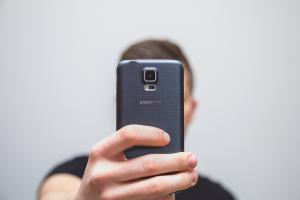
Selfie Insecurity
According to this Wall Street Journal article, Instagram, which is a prime carrier and purveyor of selfies, stated that “thirty-two percent of teen girls said that when they felt bad about their bodies, Instagram made them feel worse.”
The link between selfies and mental health is clear.
- Social media sites tell us we can share our lives with others.
- This possibility convinces us that we should share our lives in this way.
- To do this, we post pictures of ourselves doing things.
- We draw tight lines between our life and what we document online.
- So when our pictures don’t live up to our desires, we become insecure. Or full on depressed.
Selfies blur the line between the real world and the digital. They have their own rhetoric. And in a time when people’s sense of spirituality, of an existence that can’t be put under a microscope and studied, isn’t terribly strong, it’s hard to separate the two.
What is a “Self” anyway?
- Is it what receives data from the body’s senses?
- The thing making moral choices, and is accountable to divine and civic judges?
- Maybe they’re same entity? Some ethereal blob connecting to our body?
- They could be independent cogs performing those tasks.
We live in a time where authenticity is a prized virtue. You do you, boo!
How do I accomplish that when I don’t even know what the nature of a self is?
Maybe the self isn’t real
In middle school I went through a Buddhist phase. Which just meant I read stuff online and chewed on the ideas for awhile.
A big part of Buddhism is anatta, or non-self. This doctrine claims there is no eternal soul, but instead a fluid interaction of forces coming in and out of our awareness that create a false experience of self. That’s how I understood it, at least. My understanding is probably far from perfect.
During this phase I sought out secluded spots in nature to meditate in. I tried to feel my-self dissipate into the sky, water, trees, and forest sounds around me.
“I” tried believing there was no “me.”
These thought experiments ended up strengthening my Christian belief in an eternal soul. But I appreciated having the concepts to explore. Sitting on logs or rocks, intensely focused on everything I could sense that wasn’t me, I felt part of a strange community that went beyond my species.
This was the beginning of my sense that “being myself” meant “being myself” in community.
Self as product
Selfies don’t demand a sense of community. When we view them, we are shown an isolating notion of what it means to be human. As society grows more secular, for better and for worse, we engage less with ideas of the self. Because we don’t provide a firm foundation for understanding the self, we have nothing to combat the vision social media projects.
- Ads, the kind of message we’re exposed to the most, paint a picture of humans as consumers.
- Addictive technology makes it easier, and more convenient, to consume than ever before.
- The lack of other strong institutions in our lives- religious, artistic, or merely cultural- to balance matters out.
Nobody says they define themselves as a consumer. But what alternative is there in a society totally dominated by the marketplace?
Social media allows us to not only consume, but to become a consumable product ourselves. Likes, clicks, shares, comments, these are all ways we consume self. And if we’re not careful, that digital consumption can replace the value of actual affection in our minds.
Self and community
Connection is an inescapable fact of life. Theologian Walter Brueggeman states in his book The Covenanted Self that “the self is always a self in relation… reality is at core a relational interaction.”
Biologically, I exist only because of the cooperation of other members of Earth’s biome. My life depends on a network of mutuality extending across the community of life. I’m an ecosystem for the microbes in my belly and the ones who eat sleep from my eyes. I breathe out carbon dioxide that plants need to breathe.
Just by existing, I constantly connect with other children of God.
Selfies hide these connections. Consequently, they present a convincing illusion of isolation, perpetuating the feelings of loneliness many of us already have. The internet often is a secular Samsara.
Where is the self in a selfie?
Nowhere!
But humans are visual creatures. And visual representations of our-selves are incredibly seductive. That’s partly why different religions prohibit, or used to prohibit, visual representations of God and humans. It does stuff to our brains we don’t fully understand.
This is a type of knowledge we should reclaim.







